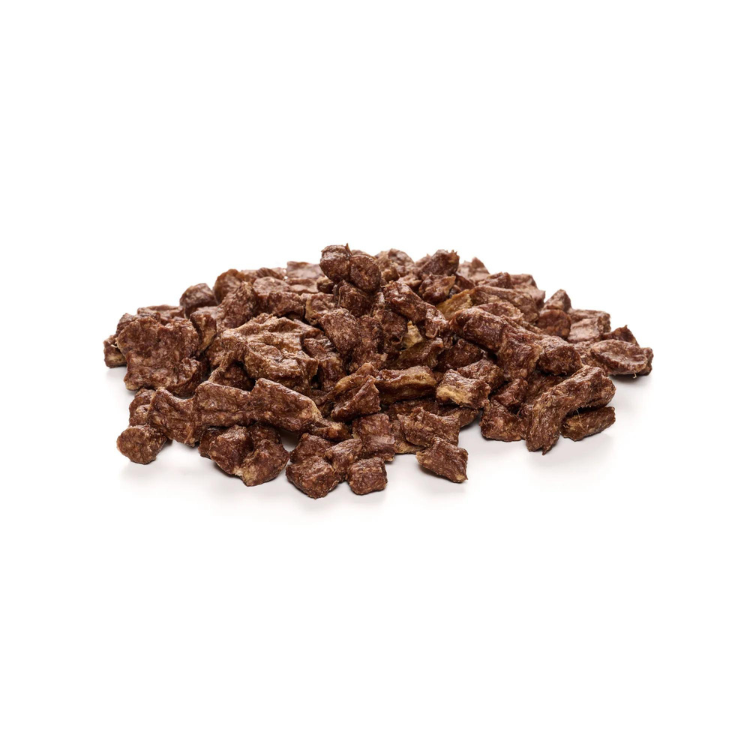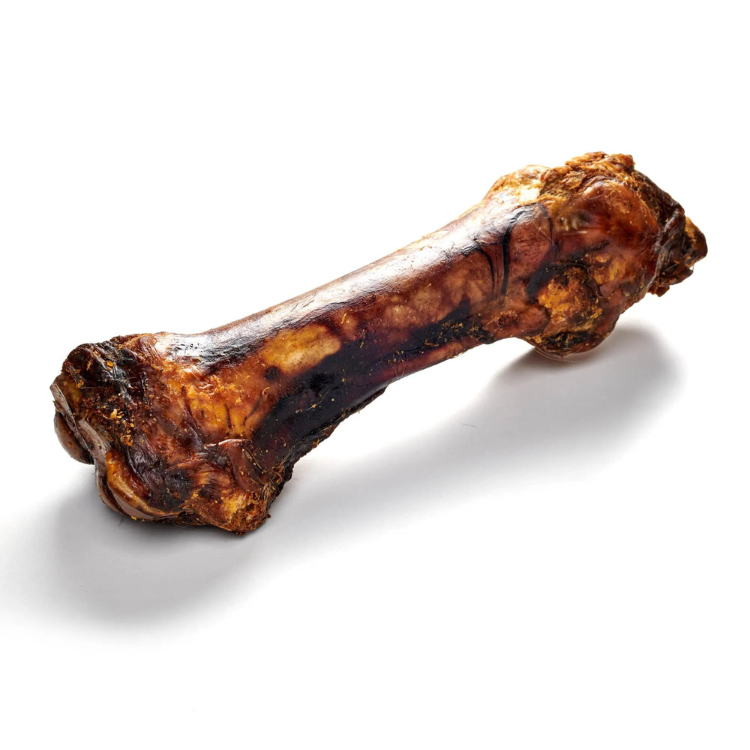
Epigenetics in dogs - influence of nutrition and stress
Share
A dog's genetics may be fixed, but that doesn't mean everything is set in stone. Imagine there was a secret code that could affect how that genetic blueprint is read. This secret code is called epigenetics, and it plays a fascinating role in a dog's life. From the food they eat to the stressors they face, many things can change the way their genes work without changing the DNA itself.
Content: Epigenetics in dogs - influence of nutrition and stress
- What is epigenetics?
- The importance of nutrition
- The influence of environmental toxins
- Measures to protect against environmental toxins
- Conclusion
Dog chews available for happy and satisfied four-legged friends!
The world of epigenetics reveals how external influences shape and control the inner workings of cells. It opens up new perspectives on the health and behavior of dogs and shows that there are many small adjustments that can be made to improve the well-being of our four-legged friends. Just as a master chef uses the same ingredients to create very different dishes, epigenetics can "cook" the same genes in a variety of ways.
What is epigenetics?
Epigenetics is a relatively new field of research that studies changes in gene expression that are not due to changes in DNA sequence. But what exactly does gene expression mean?
Gene expression: A simple example
Imagine your dog's DNA is like a big recipe book. Inside that book are all the instructions for everything that should happen in your dog's cells. Each of those instructions is a gene. Gene expression is the process of taking a specific set of instructions from the book and putting it into action - that is, when a gene is "read" and used to make a protein that performs a specific function in the body.
The DNA sequence, i.e. the sequence of bases (adenine, thymine, cytosine and guanine), always remains the same. What can change, however, is how often and to what extent certain genes are used. This is where epigenetics comes into play. It influences which genes are "switched on" or "switched off" without changing the DNA sequence itself.
Epigenetic mechanisms
There are various mechanisms by which gene expression can be influenced without changing the actual DNA. Two of the most important mechanisms are DNA methylation and histone modification.
DNA methylation
One mechanism of epigenetics is DNA methylation. Imagine that little marks are placed in some places in the recipe book that say "Do not read." These marks, called methyl groups, are attached to the DNA. When they are placed on certain genes, they prevent those genes from being read. This means that those genes are not active, even though they are potentially present.
Histone modification
Another mechanism is histone modification. DNA in cells is wrapped around proteins called histones. If DNA is thought of as threads, the histones are like spools that the threads are wound around. Chemical changes to the histones can affect how tightly or loosely the DNA is wrapped around these spools. When DNA is wrapped tightly, it is harder to read. When it is wrapped loosely, it is easier to access. These modifications can determine which genes are active and which are not.
A practical example
Let's say there is a gene in your dog's DNA that produces an enzyme important for digesting food. When that gene is read, the enzyme is produced and the dog can digest his food well.
But if the dog is under stress or fed unhealthy food, methyl groups can be attached to this gene, preventing it from being read. As a result, the gene is "turned off" and the enzyme cannot be produced. As a result, the dog can experience digestive problems, although the DNA sequence of the gene remains unchanged.
Make your dog happy with our tasty chews!
Why is that important?
Epigenetic changes can have reversible and even heritable effects. This means that not only the current well-being of the dog, but also that of its future generations can be affected. Therefore, it is important to optimize the dog's living conditions, including a balanced diet, stress management and avoidance of pollutants, to promote healthy gene expression.
Through these mechanisms, epigenetics shows that environment and lifestyle play a large role in how a dog's genes are used. Understanding these processes helps make better decisions for the dog's health and well-being.
The importance of nutrition
Nutrition plays a central role in epigenetics. Certain nutrients can directly influence gene expression. A closer look at these nutrients shows how important a balanced diet is for the dog's health.
Nutrients and their epigenetic effects
Certain nutrients can directly affect gene expression. For example, folic acid, vitamin B12 and methionine are known to affect the methylation of DNA. Methylation is a process in which small chemical groups are added to DNA, which can change the activity of genes. A balanced diet can therefore not only promote the health of the dog, but also positively influence its genetic activity.
Food and epigenetic health
Certain foods can have particularly positive epigenetic effects. For example, many green vegetables such as spinach and broccoli contain high amounts of folic acid. Meat and fish are good sources of vitamin B12 and methionine. A diet rich in these nutrients can help keep the dog's genes working healthily.
In addition, natural chews and healthy snacks can play an important role by providing nutrient-rich alternatives to processed treats. Natural chews that contain no artificial additives provide a variety of nutrients that can support a dog's epigenetic health.
For example, high-quality protein from dog sausage or hypoallergenic chews for dogs with allergies can help strengthen the immune system and reduce inflammation, which can have a positive effect on gene expression. Healthy training snacks can also be beneficial. These snacks not only provide a tasty reward during training, but also provide important nutrients necessary for methylation and other epigenetic processes. Unlike processed treats, which often contain many unhealthy additives, natural training snacks support the dog's healthy gene regulation.
Make your dog happy with our delicious snacks!
The influence of environmental toxins
Not only diet has an influence, but also environmental toxins. Chemical substances in the environment can negatively affect gene expression in dogs. These substances can cause epigenetic changes that are associated with various health problems.
Chemical substances and epigenetics
Chemical substances in the environment, such as pesticides or industrial chemicals, can negatively affect gene expression in dogs. These substances cause epigenetic changes that determine how genes are turned on and off without altering the DNA itself. These changes can have long-term effects on the dog's health.
Examples of harmful substances
Some examples of harmful substances include pesticides used in many agricultural products and industrial chemicals found in cleaning products and other household products. These substances can enter your dog's body through the skin, inhalation, or food, where they can affect gene expression.
Measures to protect against environmental toxins
To minimize the negative effects of environmental toxins on your dog's gene expression, there are some important steps that can be taken to help protect your dog's health.
Use natural care products
To minimize exposure to harmful chemicals, natural grooming products should be used. These products contain fewer or no harmful chemicals that could cause epigenetic changes. Natural shampoos, conditioners and skin care products are gentler and safer for your dog's sensitive skin.
Use environmentally friendly cleaning products
Industrial chemicals in many conventional cleaning products can be harmful. Switching to eco-friendly cleaning products that are biodegradable and do not contain toxic substances can reduce your dog's exposure to these dangerous chemicals.
Promote healthy eating
In addition to avoiding environmental toxins, a healthy diet is crucial. High-quality dog food and natural foods can help support a dog's epigenetic health. Fresh, unprocessed foods and natural chews can help keep your dog healthy.
Regular environmental monitoring
It is important to regularly check the environment where your dog lives and plays. Make sure the yard is free of pesticides and other chemicals, and make sure the drinking water is clean and free of heavy metals.
Stress management
In addition to addressing environmental toxins, stress management plays an important role. Stress can also cause epigenetic changes that can affect your dog's health. Regular exercise, mental stimulation, and a loving environment will help reduce stress levels.
Conclusion
Epigenetics shows that environmental factors such as diet, stress and pollutants can influence gene expression in dogs. These findings offer opportunities, but also challenges.
A balanced diet is important, but the quality and composition of food must be carefully chosen to achieve positive effects. Dealing with environmental toxins requires constant vigilance and adaptation. Despite the use of natural products, exposure to environmental toxins remains and requires a continuous search for safe alternatives.
Stress management needs to be tailored to each individual. What works for one dog may not be as effective for another. A holistic approach that takes all of these factors into account is essential. Dog owners need to be willing to educate themselves and adapt their strategies.
Applying epigenetic knowledge requires a thoughtful approach and continuous attention. It is a challenge that potentially offers enormous benefits for the health and well-being of our dogs.
Discover the range of dog snacks in our store!

















